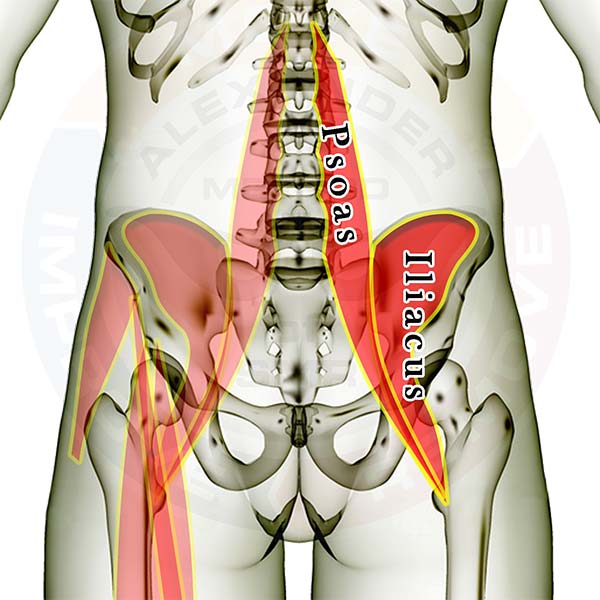
Pictured above are the hip flexor muscles. All of them pull your leg up toward your spine, and one of them pulls your spine toward your leg (like when you sit up). They are BY FAR the most influential group of muscles in the body. You can't move your hip or lower back in any direction without using one or more of these muscles. 80% of all adults over 18 years of age have some form of back pain. If you aren't checking your hip flexors for excessive tension you are missing the most significant group of muscles that contribute to proper back function.
The muscles are layered, showing how some of the muscles are covered by the others. All of the muscles are see-through so that you can appreciate the location and size of each muscle relative to the others. On the left side you can see the other muscles that are present in the same area as the hip flexors, and a couple muscles that act as mild hip flexors (Tensor Fasciae Latae & Sartorius).
Click here for a list of all the muscles.
Individual hip, lower back & thigh muscles you might be interested in: (any inactive links will be live soon)
Muscle that crosses the hip/lower back joint and crosses the hip/thigh joint (attaches to the spine and the femur)
Muscles that attach to the hip and the spine and/or ribs
- Rectus Abdominus
- External Abdominal Oblique
- Internal Abdominal Oblique
- Transverse Abdominus
- Latissimus Dorsi
- Iliocostalis Lumborum
- Longissimus Thoracis
- Quadratus Lumborum
- Multifidi
Muscles that attach to the hip and the thigh bone (femur)
- Iliacus
- Rectus Femoris
- Tensor Fasciae Latae
- Sartorius
- Gracilis
- Adductor Magnus
- Adductor Longus
- Adductor Brevis
- Pectineus
- Gluteus Maximus
- Gluteus Medius
- Gluteus Minimus
- Piriformis
- Superior Gemellus
- Obturator Internus
- Inferior Gemellus
- Obturator Externus
- Quadratus Femoris
- Biceps Femoris
- Semitendonosis
- Semimembranosis
Good luck working out those tight knots.
If you have any questions, please post a comment. We try to respond within 24 hours.
We're here to help you get more out of your training!

Hello.
I was wondering, What is the agonist muscle used when doing crunches?
Thankyou in advance
Taylor.
Hi, Taylor.
The rectus abdominus (your ‘six pack’) pulls your ribs closer to your pubic bone, so biomechanically that would be the right muscle. However, I would strongly encourage you to use your core muscles (of which your rectus abdominus is one of many) to stabilize your spine rather than mobilize it. That is, do pushups or hold a load overhead with a neutral spine position. Your abs are functionally meant to stabilize your core while you do some athletic activity. Crunches are non-athletic. Now if your pursuit is purely aesthetic, then by all means do crunches to your heart’s content.
Good luck!